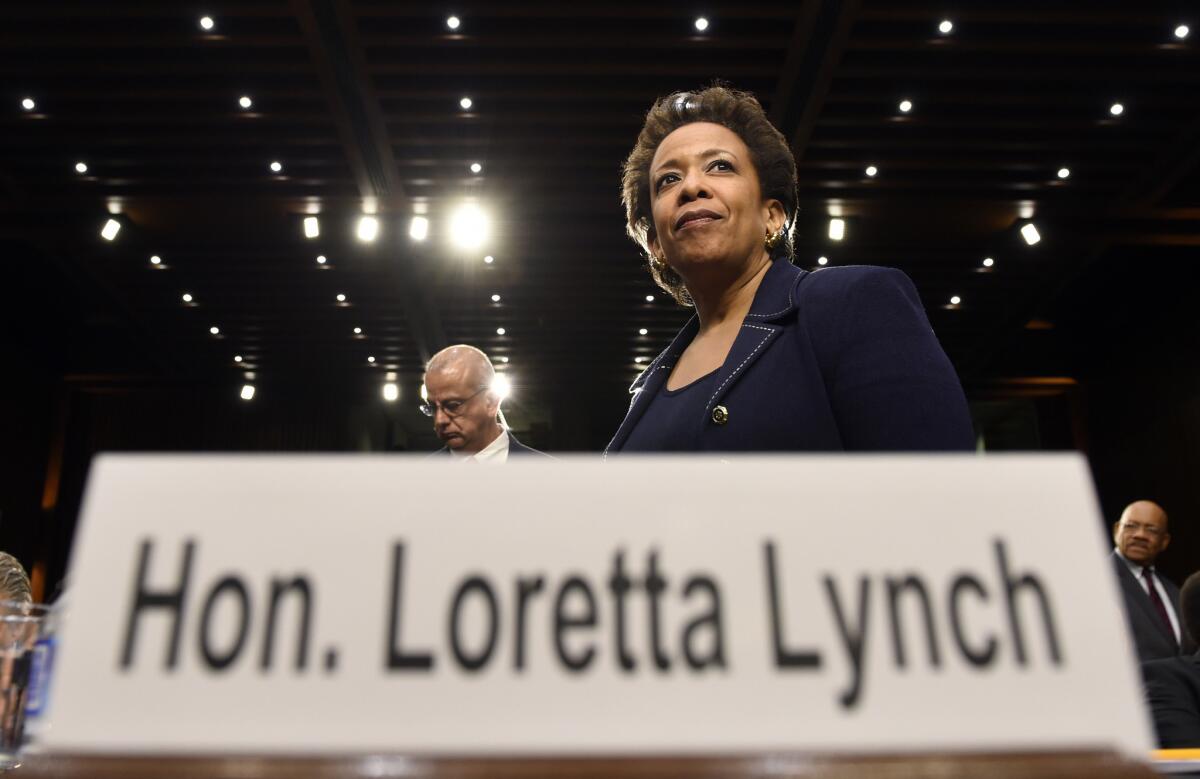Lynch confirmation puts her at center of debate on police conduct

- Share via
Reporting from Washington — After one of the longest confirmation battles in history, Loretta Lynch, President Obama’s nominee to be attorney general, is set take the reins at the Justice Department amid a national uproar over alleged police brutality that could largely define her tenure.
She is ascending as the nation’s top law enforcement officer at a time of unprecedented public pressure for federal officials to respond to the growing list of confrontations between local police and unarmed citizens, from the Aug. 9 shooting of Michael Brown in Ferguson, Mo. to last week’s death in Baltimore of Freddie Gray, who died of a broken spine in police custody. The Justice Department announced Tuesday it is investigating Gray’s death.
As a longtime federal prosecutor who has put cops in jail, yet also a favorite of the law enforcement establishment, Lynch brings credibility to the issue that few others could muster.
“She is in a good position,” said James M. Cole, who served as deputy attorney general until January, “because she has earned credibility with the law enforcement community to begin with.”
But even Lynch -- who won Senate confirmation Thursday as the nation’s first female African American attorney general -- will find it hard to address the mounting public demands for action against rogue cops while maintaining the faith of the 113,000 prosecutors, prison guards, and FBI and DEA agents on her payroll.
“That’s her first and maybe biggest challenge because if you can’t get the law enforcement community to buy into your programs or your reforms, they don’t happen,” said Seth Stoughton, a former policeman in Tallahassee, Fla., who teaches law at the University of South Carolina.
As a new member of the Obama administration, Lynch will no doubt inherit some of the baggage of her predecessor, Eric H. Holder Jr.
“Many in the law enforcement community have already developed an opinion of the Obama administration as anti-police,” Stoughton said. “With Miss Lynch being appointed as part of that administration, she already has a hurdle to overcome to get the trust of law enforcement.”
Holder was heavily criticized by police for making critical public comments about the Ferguson Police Department after the Brown shooting. The department’s subsequent criminal investigation largely exonerated the police officer of wrongdoing.
But as a newcomer, Lynch has an opportunity to make a fresh start on the issue.
Lynch seemed to send a strong signal in January that she would be different, making sure to stress her respect for law enforcement groups.
“Throughout my career as a prosecutor, it has been my honor to work hand-in-hand with dedicated law enforcement officers and agents who risk their lives every day in the protection of the communities we all serve,” Lynch said in her opening statement to the Senate Judiciary Committee. “Few things have pained me more than the recent reports of tension and division between law enforcement and the communities we serve.”
But as Lynch already knows, there are limits to the prosecutorial tools at her disposal to deal with the issue.
The sharpest tool is to file criminal civil-rights charges against police officers who cross the line, as the department did in the case of the 1992 beating of Rodney King.
But that is also hardest instrument to wield effectively because the legal bar to prove a criminal civil-rights violation is high, particularly in cases involving police.
One of her first prosecutorial decisions involving police could be in a case she knows well. As the U.S. Attorney for Brooklyn, she led the federal civil rights probe into the chokehold death by police of Eric Garner on Staten Island last year. Now, as attorney general she will make the final call on whether to charge the police officers involved.
Justice Department officials say that an indictment in the Garner case is more likely than other prominent cases in part because of the video of his death. But it will still be a tough decision for the new boss because the government must prove the police officers “willfully” deprived Garner of his rights.
Holder found it more practical to crack down against police misconduct by using his power to mandate reforms, either through lawsuits over a department’s practices or by reaching negotiated settlements to avoid legal action.
The latest case is pending against Ferguson following a Justice Department finding of systematic civil rights abuses by the police and the local courts. Lynch will have to either accept a negotiated settlement with the city or sue in federal court.
Similar discussions have been underway with the Cleveland Police Department.
Lynch had plenty of experience with police brutality before the Garner case. The biggest feather in her prosecutorial cap in Brooklyn was the conviction of New York City Police Officer Justin Volpe in 1999 for sodomizing Haitian immigrant Abner Louima.
Cole, the department’s former No. 2, said Lynch will have plenty of other issues to worry about when she is sworn in.
Among them is the reauthorization of the post 9/11 Patriot Act, a section of which has been used to authorize National Security Agency collection of telephone call records. That provision is due to expire in June.
He said that Lynch will also take over responsibility for the department’s investigation into whether IRS officials violated any laws when they targeted political groups seeking tax-exempt status. Other Justice officials mentioned the ongoing investigation into alleged manipulation of patient data by officials in the Veterans Administration.
Twitter: @timphelpsLAT
More to Read
Sign up for Essential California
The most important California stories and recommendations in your inbox every morning.
You may occasionally receive promotional content from the Los Angeles Times.











